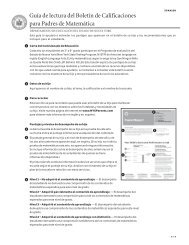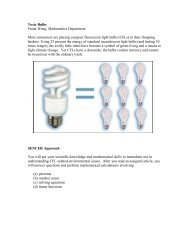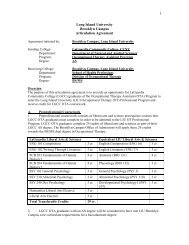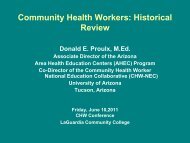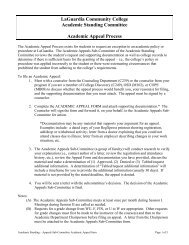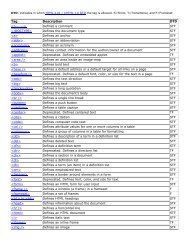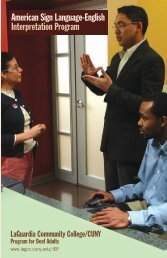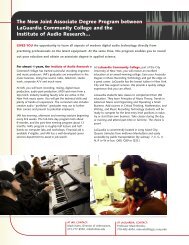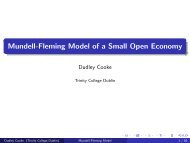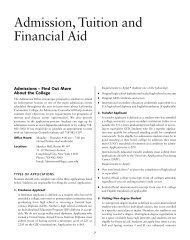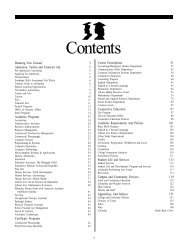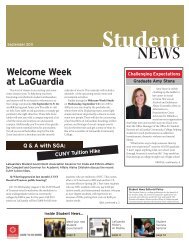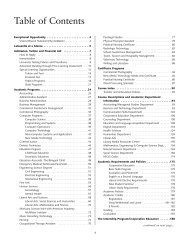Urban Sociology Post-WID - LaGuardia Community College - CUNY
Urban Sociology Post-WID - LaGuardia Community College - CUNY
Urban Sociology Post-WID - LaGuardia Community College - CUNY
Create successful ePaper yourself
Turn your PDF publications into a flip-book with our unique Google optimized e-Paper software.
<strong>LaGuardia</strong> <strong>WID</strong> Program Sample Portfolio: Arianna Martinezspace? What are they doing – talking on cell phones, eating lunch, jogging, playing with theirkids in the park? Then write about what you like or what you hate about it. Are thererecommendations you have thought of on how to make it a better public space?3. Find your neighborhood on Google Earth. Find your neighborhood on Google Map. Write abouthow these digital maps of your neighborhood are similar and different. What were you able to seeon these maps (restaurants, roads, parks, etc)? Did either map make you think about your place ina new way? If so how? Is there something about your neighborhood that you love that isn’trepresented? If so what? Could you see your house, your favorite park, shoe store, etc? Whatkinds of informational layers exist for your area and what if anything did you learn from them?4. Find an article about your neighborhood in a local newspaper that relates to an important issue inyour community, EITHER gentrification, immigration, food security, unemployment,transportation, flooding, or some new urban development project. It should be a topic that youcould explore for your final research paper. Explain how you believe this issue is impacting theneighborhood.5. Interview someone who has been living in or working in this neighborhood for many years (animmigrant, African American and/or women). Come up with your questions in advance! Askthem questions like: when and why they ended up in the neighborhood? What they like about it?How has the neighborhood changed? Did they like it better before or now and why? Write awritten summary of your interview with them, but also attach the raw interview.6. Find census data from last 10 years and analyze it, write a journalism type piece about theneighborhood changes. What was the population of your neighborhood in 1980 and compare thatto 2000. What was the ethnic and racial make-up of this community in 1980 and how has itchanged? Find other dramatic changes in the data and discuss them. (use website myciti.org)7. Find an interesting venue within your neighborhood either public art piece, unique store,museum, library, farmers market, etc that is important to the neighborhood. Review it like a travelguide.NOTE: Be sure to save and store all out-of-class writing assignments electronically.MIDTERM EXAM:There will be a take-home midterm. More information to come.FINAL RESEARCH PAPER:Submit an 8-page research project on one neighborhood in New York City and an issue that isimpacting the neighborhood.The 8-page research project should adhere to the following guidelines: 1) include a cover page;2) format with double spacing and one inch margins; 3) footnotes and citations should follow anacceptable style format; 4) include a bibliography with a minimum of 8 entries (books andarticles) and four LEXIS/NEXIS sources - for a total of 12 entries.Each <strong>Urban</strong> Observation Journal entry will be useful for the final paper, but assignment #4will be the origins of your research paper. Whichever issue you choose to write about in anexploratory manner, will then be researched fully and developed into a policy paper. Thecriteria for approaching and organizing the research paper will be fully discussed in classand a handout will be given later in the semester with guidelines.
<strong>LaGuardia</strong> <strong>WID</strong> Program Sample Portfolio: Arianna MartinezNOTE: Students are highly encouraged to discuss their research project with the instructorduring regularly scheduled office hours and students experiencing problems in their writingshould make an appointment with the <strong>LaGuardia</strong> Writing Center.FIELD TRIPS:There will be two field trips. Stay tuned for more information about these. One will be a walkingtour through the Lower East Side Tenement Museum’s Immigrant Heritage Project and the otherwill be to a nearby museum called PS1 - MoMA. If a given student cannot attend because ofemployment responsibilities, religious reasons, or family obligations please speak with theinstructor.GRADING:The final grade will be based on: In-class Participation, which includes class discussion, doingthe reading and the Reading Response Journal (25%); Mid-term Exam (25%); <strong>Urban</strong>Observation Journal (25%); and the Final Research Paper (25%).REQUIRED TEXT AND COURSE READINGS:The textbook will serve as the general frame of reference for the course. The required text is:• Nancy Kleniewski. (2006). Cities, Change & Conflict, Belmont, CA: Thomson HigherEducation. Third Edition. {Text will be on reserve in the library)• Additionally, there will also be readings posted to ERES – look for these regularly!These will be short excerpts from great urban thinkers and/or newspaper articlesaddressing contemporary urban issues. Below on the “Course Schedule” you will noticesome readings with an * next to them, this means they are available on ERES.CLASS SCHEDULE:Week OneTuesday March 4Thurs. March 6HOMEWORKWeek TwoTues. March 11Thurs. March. 13HOMEWORKWeek ThreeTues. March. 18Thurs. March 20HOMEWORKIntroduction to class & mappingTimeOutNY article & Social Life of Small <strong>Urban</strong> SpacesBuy TEXTBOOK<strong>Urban</strong> Observation Assignment #1Share UO#1Readings & In-class writingExamining <strong>Urban</strong> IssuesTheoretical PerspectivesCities in World History<strong>Urban</strong> Observation Assignment #2Share UO#1Readings & In-class writing<strong>Urban</strong> Development in the United StatesCities, Suburbs and Metropolitan AreasMike Davis*<strong>Urban</strong> Observation Assignment #3
<strong>LaGuardia</strong> <strong>WID</strong> Program Sample Portfolio: Arianna MartinezWeek FourTues. March 25ReadingsThurs. March 27When the Levees Broke Act I & IIHOMEWORKCities in EuropeCities in the Third World<strong>Urban</strong> Observation Assignment #4Week FiveTues. April 1ReadingsThurs. April 3FIELD TRIP - details to comeHOMEWORKImmigrants in the City<strong>Urban</strong> Observation Assignment #5Week SixTues. April 8Discuss UO#4 and final research paperThurs. April 10Readings & In-class writingHOMEWORKAfrican Americans in Cities<strong>Urban</strong> Observation Assignment #6Week SevenTues. April 15Brooklyn MattersThurs. April 17Readings and in-class writingHOMEWORK <strong>Urban</strong> Observation Assignment #7SPRING BREAK!Week EightTues. April 29Thurs. May 1HOMEWORKWeek NineTues. May 6Thurs. May 8HOMEWORKWeek TenTues. May 13Thurs. May 15HOMEWORKWeek ElevenTues. May 20Thurs. May 22Week TwelveTues. May 27Thurs. May 29Week ThirteenTues. June 3Thurs. June 6Revise <strong>Urban</strong> Observations Journals to prepare Portfolio!Midterm (assignment posted to ERES!)MidtermWomen in CitiesMidterm DUE & <strong>Urban</strong> Observation Portfolios DUE!FIELD TRIP - P.S.1 WACK exhibitionSocial Class and NeighborhoodsResearch paper thesis statement, sources & outline!Readings & URBAN IDENTITIES MATRIX gamePlanning for the Future of CitiesPAPER FIRST DRAFTReadings & in-class writing assignmentBRING FIRST DRAFT FOR PEER REVIEW!!!!Closing Cities DiscussionFilmNO CLASSFINAL PAPER DUE



